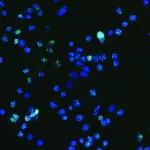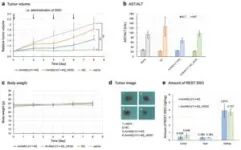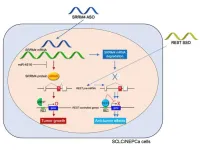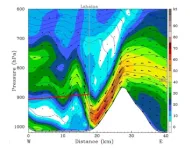(Press-News.org) New class of cancer mutations discovered in so-called ‘junk’ DNA
Using artificial intelligence, Garvan Institute researchers have found potential cancer drivers hidden in so-called ‘junk’ regions of DNA, opening up possibilities for a new approach to diagnosis and treatment.
Non-coding DNA – the 98% of our genome that doesn’t contain instructions for making proteins – could hold the key to a new approach for diagnosing and treating cancers, according to a new study from the Garvan Institute of Medical Research. The findings, published in the journal Nucleic Acids Research, reveal mutations in previously overlooked regions of the genome that may contribute to the formation and progression of at least 12 different cancers, including prostate, breast and colorectal.
The discovery could lead to early diagnosis and new treatments effective for many cancer types.
“Non-coding DNA was once dismissed as ‘junk DNA’ due to its apparent lack of function,” says Dr Amanda Khoury, Research Officer at Garvan and co-corresponding author of the study. “Our research has found mutations in these DNA regions that could open an entirely new, universal approach to cancer treatment.”
Investigating DNA ‘anchors’ disrupted in cancer
The researchers focused on mutations affecting binding sites for a protein called CTCF, which helps fold long strands of DNA into specific shapes. In their previous work, they found that these binding sites bring distant parts of the DNA close together, forming 3D structures that control which genes are turned on or off.
“We had already identified a subset of CTCF binding sites that are ‘persistent’ – that is they act like anchors in the genome, present across different cell types,” says Dr Khoury. “We hypothesised that if these anchors become faulty, it could disrupt the normal 3D organisation of the genome and contribute to cancer.”
To test this, the researchers developed a new sophisticated machine learning (AI) tool called CTCF-INSITE, which used genomic and epigenomic features to predict which CTCF sites are likely to be persistent anchors in a total of 12 cancer types. They then assessed more than 3000 tumour samples from patients diagnosed with the 12 cancer types, available from the International Genome Consortium database, and found the persistent anchors were rich with mutations.
“Using our machine learning tool, we identified persistent CTCF binding sites in 12 different cancer types,” says Dr Wenhan Chen, first author of the study. “Remarkably, we found that every cancer sample had at least one mutation in a persistent CTCF binding site.”
“This research confirmed that persistent CTCF binding sites are ‘mutational hotspots’ in cancers. We think these mutations give cancer cells a survival advantage, allowing them to proliferate and spread,” adds Dr Khoury.
Towards a universal cancer treatment approach
The findings could have broad implications for understanding and treating many types of cancer. “Most new cancer treatments have to be carefully targeted to specific mutations not always common amongst different tumour types, but because these CTCF anchors are mutated across multiple different cancer types, we’re opening up the possibility of developing approaches that could be effective for multiple cancers,” says Professor Susan Clark, Head of the Cancer Epigenetics Lab at Garvan and lead author of the study.
The researchers are now planning further large-scale experiments using CRISPR gene editing to investigate how these anchor mutations disrupt the 3D genome and potentially promote cancer growth.
“Now that we’ve discovered what we believe to be critical anchors of the genome and shown they are important to maintaining homeostasis of the genome architecture, it makes sense that these non-coding DNA mutations would disrupt this homeostasis in the cancer cell – a hypothesis we will test when we edit them out,” says Professor Clark. “Observing the downstream impact, we hope to identify key genes or gene pathways that are affected by the mutations, which could serve as markers for early cancer detection or targets for new treatments.”
“Finding these clues that were hidden in a vast amount of data is a powerful example of how artificial intelligence is boosting medical research,” she says. “This is a whole new frontier in the study of cancer, and we’re excited to explore it further.”
--ENDS--
This research was supported by a National Health and Medical Research Council Ideas grant and Investigator grant funding.
Dr Amanda Khoury is a Conjoint Lecturer and Professor Susan Clark is a Conjoint Professor at St Vincent's Clinical School, Faculty of Medicine and Health, UNSW Sydney.
END
New class of cancer mutations discovered in so-called ‘junk’ DNA
Using artificial intelligence, Garvan Institute researchers have found potential cancer drivers hidden in so-called ‘junk’ regions of DNA, opening up possibilities for a new approach to diagnosis and treatment.
2024-07-03
ELSE PRESS RELEASES FROM THIS DATE:
High ceilings linked to poorer exam results for uni students
2024-07-03
Ever wondered why you performed worse than expected in that final university exam that you sat in a cavernous gymnasium or massive hall, despite countless hours, days and weeks of study? Now you have a genuine reason – high ceilings.
New research from the University of South Australia and Deakin University has revealed a link between rooms with high ceilings and poorer examination results.
A study published in the Journal of Environmental Psychology, led by architecture and psychology-trained UniSA researcher Dr Isabella Bower in collaboration with educational psychology researcher Associate Professor Jaclyn Broadbent from Deakin University, demonstrates that building design impacts ...
Low-dose aspirin could help prevent pregnancy complications caused by flu infections
2024-07-03
A world-first study has found low-dose aspirin may treat flu-induced blood vessel inflammation, creating better blood flow to the placenta during pregnancy.
Animal studies examined whether the treatment for preeclampsia could be applied to flu infections – and the results, according to the research team, were very promising.
Lead researcher and RMIT Post-Doctoral Research Fellow, Dr Stella Liong, said flu infections during pregnancy can resemble preeclampsia, a pregnancy complication that causes inflammation to the aorta and blood vessels.
Low-dose aspirin is commonly taken to prevent preeclampsia, as it stops the body from creating chemicals that cause ...
Splicing it all together in the fight against cancer
2024-07-03
Osaka, Japan – Neuroendocrine tumors, including small cell lung cancer and neuroendocrine prostate cancer, are very aggressive with high chances of spreading. However, many individuals develop resistance to few available treatment options, leading to poor patient outcomes. Researchers are therefore aiming to develop new therapeutic methods that focus on the disease-specific molecular mechanisms of these tumors.
In a recent article published in Molecular Therapy: Nucleic Acids, a team of researchers at Osaka University describe a strategy targeting one such mechanism, called RNA splicing.
RNA splicing is the process ...
World’s first research journal dedicated to psychology and artificial intelligence announced
2024-07-03
Taylor & Francis has announced the launch of the Journal of Psychology and AI, an open access journal that aims to foster dialogue between technologists developing artificial intelligence (AI) systems and psychology researchers exploring human behavior, cognitions, and emotions.
As AI technology becomes increasingly integrated into our lives, the new journal will publish reports on direct human interaction with AI as well as exploring how it is influencing the way we interact with and think about the world.
Other research areas relevant to psychology and AI include using AI for the ...
Zayed to lead new Division of Surgical Sciences
2024-07-03
Mohamed A. Zayed, MD, PhD, a vascular surgeon known for his pioneering research in vascular diseases, has been appointed director of the newly established Division of Surgical Sciences in the Department of Surgery at Washington University School of Medicine in St. Louis. He will assume his new role July 1.
Zayed, a professor of surgery, of radiology, of molecular cell biology, and of biomedical engineering, has more than 25 years of experience leading multifaceted research programs in biotech, medical startups ...
How dust pollution from shrinking Great Salt Lake affects communities disproportionately
2024-07-03
New research from the University of Utah demonstrates how wind-carried dust from the exposed bed of Great Salt Lake is disproportionately affecting disadvantaged communities in the Salt Lake metro area.
The findings suggest restoring the lake to a healthy water level would reduce disparities in harmful dust exposure experienced by different racial/ethnic and socioeconomic groups, along with delivering other ecological and economic benefits.
Exposure to particulate pollution arising from dry portions of the playa is highest among Pacific Islanders and Hispanics and lowest among white people compared to other racial/ethnic ...
Clever clothes! Seams in clothing capture body movement
2024-07-03
Everyday clothing may soon be able to capture and record body movements according to new research published by the Universities of Bristol and Bath.
Harmless low voltages are passed through conductive threads which are stitched into garment seams to create electrical circuits. Their resistance changes with the movement of the wearer's body. The work opens up new possibilities to make digital clothing which senses and captures movements much more accurately than is possible using current phones and smart watches.
The paper, presented at the Designing Interactive Systems (DIS) conference in Copenhagen ...
AMS science preview: Maui wildfire, Salt Lake drying, traffic and weather
2024-07-02
The American Meteorological Society continuously publishes research on climate, weather, and water in its 12 journals. Many of these articles are available for early online access–they are peer-reviewed, but not yet in their final published form.
Below is a selection of articles published early online recently. Some articles are open-access; to view others, members of the media can contact kpflaumer@ametsoc.org for press login credentials.
JOURNAL ARTICLES
Understanding Observed Precipitation Change and the New Climate Normal from the Perspective of Daily Weather Types in the Southeast U.S.
Journal of ...
Research spotlight: Identifying genes to prolong an anti-tumor immune response
2024-07-02
How would you summarize your study for a lay audience?
We set out to identify genes that are commonly expressed in CD8+ T cells, killer immune cells that can drive anti-tumor immunity, across many types of human cancers. Our goal was to uncover new therapeutic targets, which could inform novel treatment strategies that could benefit many patients. To do this, we developed a novel mathematical method that can be applied to data from many types of cancers.
What knowledge gaps does your study help to fill?
We know the presence fof CD8+ T cells is essential for ...
SRI is developing a new malaria treatment that aims to protect from the disease
2024-07-02
SRI today announced that researchers are developing a new treatment that aims to provide a better option to fight malaria, particularly for people in low-income and rural regions. Researchers in SRI’s Pharmaceutical Sciences Lab are working on an affordable, shelf-stable anti-malarial drug formulation that could provide months of protection against the mosquito-borne disease with just a single injection, which means that individuals would no longer have to worry about missing a dose. Additionally, it has a low propensity for resistance and can be ...
LAST 30 PRESS RELEASES:
Scientists identify smooth regional trends in fruit fly survival strategies
Antipathy toward snakes? Your parents likely talked you into that at an early age
Sylvester Cancer Tip Sheet for Feb. 2026
Online exposure to medical misinformation concentrated among older adults
Telehealth improves access to genetic services for adult survivors of childhood cancers
Outdated mortality benchmarks risk missing early signs of famine and delay recognizing mass starvation
Newly discovered bacterium converts carbon dioxide into chemicals using electricity
Flipping and reversing mini-proteins could improve disease treatment
Scientists reveal major hidden source of atmospheric nitrogen pollution in fragile lake basin
Biochar emerges as a powerful tool for soil carbon neutrality and climate mitigation
Tiny cell messengers show big promise for safer protein and gene delivery
AMS releases statement regarding the decision to rescind EPA’s 2009 Endangerment Finding
Parents’ alcohol and drug use influences their children’s consumption, research shows
Modular assembly of chiral nitrogen-bridged rings achieved by palladium-catalyzed diastereoselective and enantioselective cascade cyclization reactions
Promoting civic engagement
AMS Science Preview: Hurricane slowdown, school snow days
Deforestation in the Amazon raises the surface temperature by 3 °C during the dry season
Model more accurately maps the impact of frost on corn crops
How did humans develop sharp vision? Lab-grown retinas show likely answer
Sour grapes? Taste, experience of sour foods depends on individual consumer
At AAAS, professor Krystal Tsosie argues the future of science must be Indigenous-led
From the lab to the living room: Decoding Parkinson’s patients movements in the real world
Research advances in porous materials, as highlighted in the 2025 Nobel Prize in Chemistry
Sally C. Morton, executive vice president of ASU Knowledge Enterprise, presents a bold and practical framework for moving research from discovery to real-world impact
Biochemical parameters in patients with diabetic nephropathy versus individuals with diabetes alone, non-diabetic nephropathy, and healthy controls
Muscular strength and mortality in women ages 63 to 99
Adolescent and young adult requests for medication abortion through online telemedicine
Researchers want a better whiff of plant-based proteins
Pioneering a new generation of lithium battery cathode materials
A Pitt-Johnstown professor found syntax in the warbling duets of wild parrots
[Press-News.org] New class of cancer mutations discovered in so-called ‘junk’ DNAUsing artificial intelligence, Garvan Institute researchers have found potential cancer drivers hidden in so-called ‘junk’ regions of DNA, opening up possibilities for a new approach to diagnosis and treatment.







